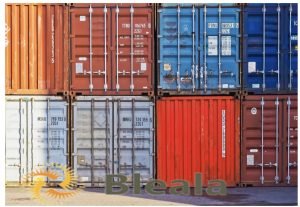Having a mini exportation trade business is a good investment idea which is easy to navigate through. Though there are so many hurdles on the way, however, to be successful there are certain measures you must consider or look up to.

That is why we have compiled a comprehensive guide on how to start your mini-export trade business in Nigeria. Well, without wasting much of our precious time, let’s dive into the subject matter.
What is a mini-export trading business in Nigeria?
You may not understand what export trading means.
It’s not an issue, to me, the Mini exportation trade business in Nigeria is a form of international trade where businesses or individuals export small quantities of Nigerian-made or sourced products to other countries.
This type of business typically deals with agricultural products, fashion items, art and craft, processed foods, and other goods.
It must be stressed that not all goods are accepted.
Imagine, can a country accept the export of countraband products? No. No country will accept such. So, to know the goods that are accepted for export by the Nigerian government, take your time to read further.
This might be helpful: What are The Best Businesses to Start in Nigeria in 2023 with Low Capital?
What are the Goods accepted for export by the Nigerian Government
Some of the goods acceptable for exportation in The eyes of the Nigerian law include the following
- Cassava
- Yam
- Cocoa
- Palm oil
- Rubber
- Groundnut
- Maize
- Rice
- Beans
- Sorghum
- Sesame seed
- Shea butter
- Cashew nuts
- Ginger
- Melon seed (egusi)
- Okra
- Pepper (chili and bell pepper)
- Tomatoes
- Pineapple
- Plantain
- Banana
- Orange
- Mango
- Guava
- Lemon
- Watermelon
- Melon
- Cucumber
- Grapes
- Poultry (chicken and eggs)
Other products include:
- Footware
- Confectionary
- Chemicals
- Building and construction materials and a lot more.
Products that can not be exported in Nigeria
The following goods are considered prohibited from exportation by Nigerian Law. They include:
- Arms and ammunition
- Narcotics and illicit drugs
- Counterfeit and pirated goods
- Wildlife and endangered species
- Hazardous materials and chemicals
- Human remains and body parts
- Used tires
- Obscene and pornographic materials
- Cultural artifacts and antiques without proper documentation
- Products with false origin or labeling
How to start a mini export trade business in Nigeria
Thanks for reading to this length. I am sure you have sound knowledge of what mini-export trade business entails in Nigeria.
Know, let’s discuss how to start it.
How do I start Mini export business? Well, exporting goods is lucrative but it demands immediate planning and proper preparation.
With that that on the table, you’re good to go. However, to ace a high chance of success, consider the following when starting your Mini importation business in Nigeria.
- Identify the type of export trade you want to do.
- Find out suppliers
- Get or obtain the necessary licenses and permits
- Choose the appropriate shipping method
- Promote your business
1. Identify the type of export trade you want to do.
This is The very first step. You need to know the type of export trade you want to specialize in.
The different types of export trades in Nigeria include agricultural products, manufactured goods, and industrial commodities.
With this, you will be able to consider your business goals and choose the type of export that best suits your needs.
2. Find out the suppliers
Secondly, when you have identified the type of export you’re interested in, you need to find potential suppliers. This is so because, without suppliers, you can’t export things unless you produce them yourself.
With this, you will need to find reliable suppliers who can provide the goods you need for export.
3. Get or obtain the necessary licenses and permits
The next step is to get the necessary license and permits from different authorities as required by the types of export you are into. These documents include:
- Corporate Affairs Commission
- Obtaining a license from the Nigerian Export Promotion Council (NEPC)
- The Standard Organization of Nigeria (SON)
- The Nigerian Customs Service (NCS) Export permit
- The Nigerian Port Authority (NPA)
- The National Agency for Food and Drug Administration and Control (NAFDAC) certificate
4. Choose the appropriate shipping method.
This is the penultimate step. The method you choose to ship your goods will depend on their size and weight, as well as the location of your supplier and buyer.
You can choose from air freight, sea freight, or land transport services. For instance, if you’re into bone straight business, you can choose air means of transportation because it saves time and costs.
On the other hand, if you’re exporting agricultural products, you can use the land because of its perishability nature. Either way, knowing your means of shipping is very important.
Related Article: 7 Ways to Invest Online and Double Your Money in 1 Year
5. Promote your business.
This is The last step. Once you’ve established yourself as a mini importation business in Nigeria, it’s important to promote your business so potential buyers are aware of what you have to offer.
You can advertise your services or goods on social media, through email marketing campaigns, or even traditional methods like flyers and radio spots can help you generate more interest in your business.
Thanks for reading to this end.
FAQs
What is the easiest thing to export?
In actual sense, It’s hard to say the easiest thing to export. However, based on the market demand, competition, regulations, and logistics some products are commonly exported due to high demand, ease of production, and lower regulations.
These products include cocoa, palm oil, confectioneries, rubber and seasoning.
How much do you need to start an export business in Nigeria?
If you want to start a small export business, you can start with 100,000 Naira.






